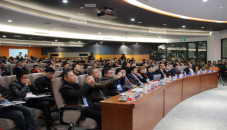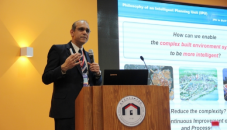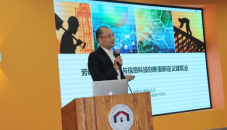The "Future City and Smart Construction" Academic Forum Was Held
January 16, 2018
On January 13, 2018, The School of Construction Management And Real Estate in Chongqing University host an academic conference, “future city and intelligent building", in the school’s 214 lecture hall successfully. The forum is supported by School of Urban-Rural Planning and Development in Chongqing University(Zhiku). This academic conference aims to appeal more people to paying attention to the construction of future city and the vital sense of intelligent building, and to pushing forward the development process of intelligent building and construction informatization. The theme included building information modeling, AI, big data, informatization and industrialization, the robot application of construction project, AR/VR /MR and visualization, the decision making system of designing or planning stage, intelligent planning and designing, the application of simulation technology in construction, 3D printing technology, the application of UAV(unmanned aerial vehicle) technology in construction and lean manufacturing.
The forum invited 11 experts and scholars from Western Sydney University in Australia, Purdue University, Hong Kong University, Hong Kong University of Science and Technology, Tongji University, Huazhong University of Science and Technology to give speeches. More than 200 officials and entrepreneurs in the construction and real estate field attended this academic conference.
Yu Xiaobin(Chief Economist of Chongqing Urban and Rural Construction Committee) , Meng Weidong (Vice President of Chongqing University ) , Hu Xuebin(Committee Member of Chongqing University and Minister of the Propaganda Department) and Yuan Wenquan(Director of Social Science Research at Chongqing University) attended this conference. Liu Guiwen, Director of Construction Management and Real Estate School in Chongqing University, hosted the meeting. Meng weidong, Vice President of Chongqing University, delivered a speech. Meng weidong affirmed the important influence of the School of Construction Management and Real Estate and the whole building department on industry and academia. He referred that Chongqing University should make contribution to Chongqing’s transformation to artificial intelligence and industrialization in construction under the background of constructive informatization and intelligence. He also pointed out that cooperation with Huawei and Ali, exploring new growth points of the Department of Architecture are the current requirements and directions. In the end, he gave best wishes to the meeting. After that, leaders and guests took photos in front of the school building.

Meeting venue
Then, Kerry London, Assistant Dean of the School of Computer Engineering and Mathematics at the University of Western Sydney, first shared the academic achievements of "Enabling Advanced Construction Technologies Smart Cities". Prof. Kerry London thought the thinking boundary of "construction" should expand to the depth and breadth of "intelligent city". Today, with data-driven city advancing, intelligent urban construction requires the use of OSM collaborative training package to improve employees' skills, optimize the team size and structure, and address conflicts of interest. Prof. Kerry London researched for models through innovative role network theory, explaining and analyzing the obstacle and drive factors of intelligent city construction in higher-level coordination, making contributions to the development of the theory of inclusive digital collaborative practice model. The speech won the applause of experts and scholars.
Luo Hanbing, Vice President of the School of Civil Engineering and Mechanics of Huazhong University of Science and Technology, delivered a speech "Intelligent Safety Management in Construction" which is based on the long-term experience of underground complex construction in Wuhan subway. According to the safety blind areas and management difficulties in complex underground subway construction and the five relations of safety management, professor Luo has studied automatic identification of subway station construction safety risk based on the construction drawings, safety and portable sensitive internet monitoring system for the blind areas of underground engineering, and intelligent technology of automatic identification of construction site workers' unsafe behavior based on machine vision. Besides, he further introduced future research direction in all aspects, such as tunnel quality testing, intelligent wear evaluation of shield props and other unsafe behavior recognition in the construction site, providing a new perspective for the practical application of intelligent construction in engineering management.
Fan Zesen, Chief Architect of Zhongjian Science and Technology co. LTD, shared the research“Integrated Design Theory of Prefabricated Buildings and Intelligent Construction Practice Exploration”. He thought system integration is the core of prefabricated construction integration. He also put forward “one body two wings" is prefabricated building’s integrated development ideas, and pointed out that the development trend of prefabricated construction integration is intelligent building, the digital conceptual construction is the direction of future. Fan zesen also showed the prefabricated construction integration practice project his company has completed , and the inner-enterprise online-offline collaborative platform of prefabricated construction integration, realizing the application of“full BIM” for all staff, full professional and whole process. .
At 11:00 a. m., after a short coffee break, Wang Guangbin, Vice President of the School of Economics and Management of Tongji University, delivered a speech, "Intelligent Building Paradigm Features and Thinking in Research Field". Compared with contemporary advanced manufacturing industry, Professor Wang Guangbin pointed out the future trend of intelligent building is the integration and innovation of digital and entities. From three aspects of work environment, building process and production object, he explained the intelligent building process and framework based on the technology of model. He thought product informationization and industrial informationization is the key links to improve the information processing functions, promote optimization and reorganization of resources and realize industrial upgrading and construction paradigm changed.
Later, Lv Weisheng, Vice President of the School of Architecture at the Hongkong University, gave a speech, “to Develop Intelligent Construction with a Focus on "big" and "small" : an Example of Intelligent Building”. Associate professor Lv Weisheng thought we should focus on the "big" word cloud about intelligent construction, start first step from the "small" start. The intelligent construction unit (SCOs) shows the product make superior performance in customized intelligent building. He showed the latest awarded SCOs products called i-Core in meeting, and introduced its applications in logistics and supply chain management, occupational health and safety (OHS) management, the power switch control, and prospective big data analysis for equipment management, arousing the strong interest of participants.
After wonderful speeches of the morning guests, Dean Liu Guiwen thanked the guests and expected that the speakers would bring more insights and shocks in the afternoon

Makarand Hastak, Dean of School of Construction Engineering and Management, Purdue University, gave a speech
At 2:30 p. m., the second-half academic forum “Future City and Intelligent Building“ officially started. Makarand Hastak, Dean of the School of Construction Engineering and Management at Purdue University, gave a speech titled "Future City and Smart Built Intelligent Planning Unit". Professor Hastak first proposed the concept of intelligent planning unit (IPU). IPU disassembles physical entity in the building environment and their interaction process into different levels, followed by IPU planning (including strategic positioning and planning and design), the IPU application (including replication and composite) and the IPU network (including interaction and refining). Under the modular scale, to elaborate and control the IPU that accumulates knowledge on different complex layers, which can improve the program effect, and ultimately provide timely service and accurate information for decision makers in order to make better decisions. He pointed out that the IPU of construction project should rise to the community, city level, and the physical information fusion of intelligent planning unit function module can provide sufficient information and decision-making reference for problems emerged in future intelligent building.
Afterwards, Professor Tong Yuan from the School of Architecture and Urban Planning of Tongji University made an academic sharing. The theme of the lecture was "Study on Intelligent Construction Technology of Construction Robots". Prof. Yu Yuan introduced the modeling method, solving method and several structural optimization software used by his team to achieve the minimum mass and maximum stiffness targets in structural optimization design. Subsequently, through a series of video clips, Yuan Yu explained to everyone the fruitful results of the intelligent construction of the application of construction robots. With the advent of artificial intelligence era, robots may make the world become indifferent, but Prof. Yuan Yu has proved that robot era will make assembly buildings more possible.
Subsequently, Liu Gang, Chief Business Architect of GLD Technology Co. Ltd. and Dean of GLD Research Institute, gave a speech titled “Digital Architecture Drives Transformation and Upgrading of the Construction Industry”. Liu Gang analyzed the digital transformation path of the construction industry from three aspects of digital strategy, digital technology and digital action, three levels of industry, enterprise, and project. He proposed the promotion of industry supervision and service improvement, driving enterprise management and business model innovation, leading upgrading of the entire process of the project are the digital transformation’s goals. In the end, the main body will build an ecological platform from three aspects and three levels to promote the digital transformation and upgrading of the construction industry. He pointed out that the digital transformation of the industry is the trend of the times and the construction industry calls for transformation and upgrading. Under this trend, "Digital Architecture" integrates digital technology and construction industry, which is the key foundation for project success, the focus of innovation in the construction industry and the core engine of transformation and upgrading.
Jack Cheng, Associate Professor of the school of Civil and Environmental Engineering of the Hong Kong University of Science and Technology, gave a speech titled "BIM, loT and AI - Making Smart Cities Smarter". Jack Cheng first asked why cities need intelligence and what kind of attributes smart cities need to have, and told us IT is an important technology for building a smart city. Then he introduced three IT technologies: BIM, IoT, and AI, and their relevance and application to smart cities, emphasizing the necessity for IT support in the future construction of smart cities to collect basic data, build data network and solve other problems. He pointed out that cities in the future are data-driven and more intelligent, so they will depend more on innovative technologies.
Next, Mr. Zhang Lijie, Senior Vice President and Technical Director of Shenzhen Swell Technology Co. Ltd. , gave a speech on the theme of “From BIM to CIM: Meeting China’s Urban Construction, Operation, and Management Model Transformation”. Zhang Lijie introduced the application of PPP in information project and the application of BIM and CIM in the project, and emphasized that BIM is an important method for quantitative evaluation of the projects using PPP mode instead of the government's traditional investment operation mode to provide public service. He also introduced the Siweier' BIM series software which provides tool software and BIM project management platform to strengthen BIM's implementation of the critical path; then he mentioned on building a CIM platform to build a new mode of future urban asset management and intelligent operation based on 3D GIS (geographical information system technology) and BIM technology. In the end, he pointed out that BIM's data would integrate and develop with technologies such as Internet technology, GIS, and big data management. The dreams of smart cities will come true.

Liu Guiwen, Dean of School of Construction Management and Real Estate, Chongqing University, gave a speech
In the end, Prof. Liu Guiwen, Dean of the school of Construction Management and Real Estate of Chongqing University, shared his academic work. The theme of the lecture was “Labor Costs Change and Information Technology Innovation to Redefine Construction Industry”. Liu Guiwen proposed to use science and technology to reduce the use of labor in order to meet the challenges posed by the large growth potential of China's labor costs, and the transformation of architectural technology and management informationization will guide the transformation of the construction industry from extensive to intensive. To be specific, technology redefines the designing method, construction technology, and management method of the construction industry, so as to achieve the purpose of upgrading intelligent building in the future through the upgrading of the construction industry.
The forum lasted until 6:00 p. m., and ended successfully with full applause. Guests focused on hot issues such as the future city and intelligent building, and discussed issues and solutions for the development of information technology in the urban development and construction industry. This forum is not only significant to strengthen the related discipline construction, cooperation, and personnel training of our university, but also attracts people from all walks of life to pay attention to the construction of future cities and intelligent building, to promote the development of smart cities and building industrialization and informationization.